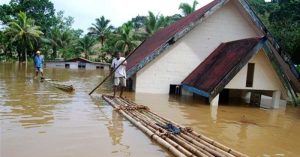Ahead of COP28, a new report by the University of Delaware provides “best estimates” of the economic losses currently suffered by all countries due to climate change and zooms in on the vulnerability of low-income countries and tropical regions, which are already losing 10% of their GDP or more

Climate change is already causing GDP and capital wealth losses at the global level, with developing countries bearing the brunt of impacts, according to a new report published on Tuesday, November 28, 2023, by the University of Delaware’s Gerard J. Mangone Climate Change Science and Policy Hub.
The report, titled: “Loss and Damage Today: How climate change is impacting output and capital”, coincides with the start of COP28, where countries are expected to adopt a framework for the new UN fund to help nations recover from the “loss and damage” caused by climate change as decided at COP27.
Globally, climate change has led to a population-weighted GDP loss of 6.3% in 2022. The unweighted percentage of global GDP lost is estimated at 1.8%, or about $1.5 trillion, and the difference between those two numbers reflects the uneven distribution of impacts, which concentrate in low-income countries and tropical regions that typically have more population and less GDP.
Indeed, least developed countries are exposed to an average population-weighted GDP loss of 8.3%, and Southeast Asia and Southern Africa are particularly affected, with countries losing an average 14.1% and 11.2% of their GDP, respectively.
“The world is trillions of dollars poorer because of climate change, and most of that burden has fallen on poor countries. I hope that this information can clarify the challenges that many countries already face today and the support they urgently need to address them”, says Dr. James Rising, author of the study and Assistant Professor at the University of Delaware.
Climate change is also exacerbating existing global inequalities, with many high-income countries currently experiencing net GDP gains. These benefits mostly arise from reduced winter chill, which lowers energy consumption and mortality rates. Yet as the planet continues to warm, these benefits are poised to erode and eventually turn negative, with the energy and health effects of hotter summers gradually offsetting benefits from mild winters.
“Our analysis draws on 58 economic models and employs machine learning to produce a ‘best-estimate’ of the current GDP and capital wealth losses from climate change,” says the author. “The last 10 years have seen a revolution in how we understand macroeconomic risks, and this report builds a synthesis of all of their insights.”
The report provides impact estimates for key UNFCCC negotiating groups and relevant stakeholders, such as the Climate Vulnerable Forum.
The analysis also reveals the complex dynamics between climate change, economic outcomes, and capital investments. Low and middle-income countries face significant capital losses, posing challenges to their long-term economic resilience and growth. Low and middle-income countries have experienced $2.1 trillion in produced capital losses due to climate change.
When GDP and capital losses are combined, the analysis finds that low and middle-income countries have experienced a total loss of $21 trillion since the Rio Convention was adopted in 1992. All UNFCCC party groupings except for the EU have experienced total losses, with the greatest losses on the G-77 at $29 trillion. These losses are expected to be conservative estimates, since important impact channels and non-market losses are not included in the analysis.
